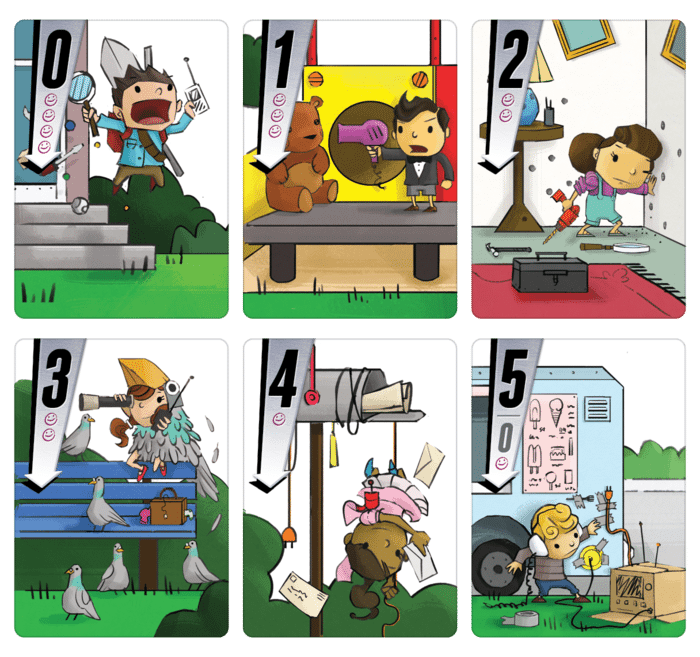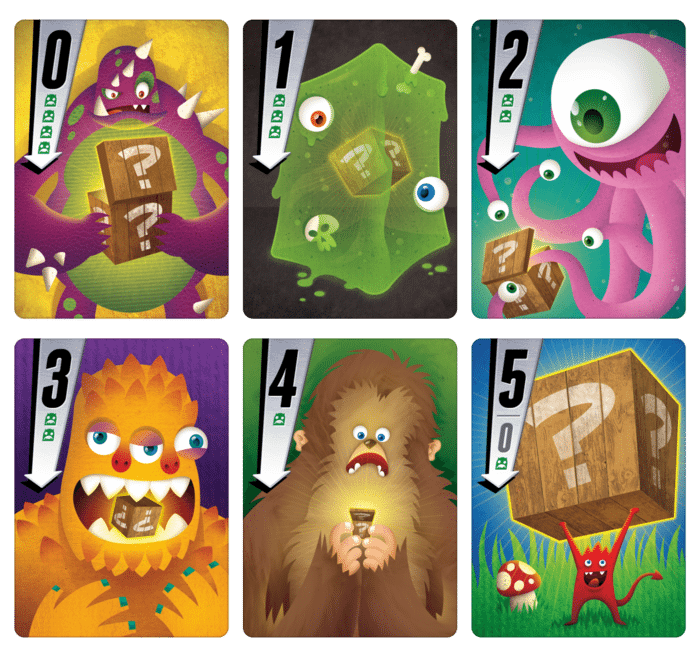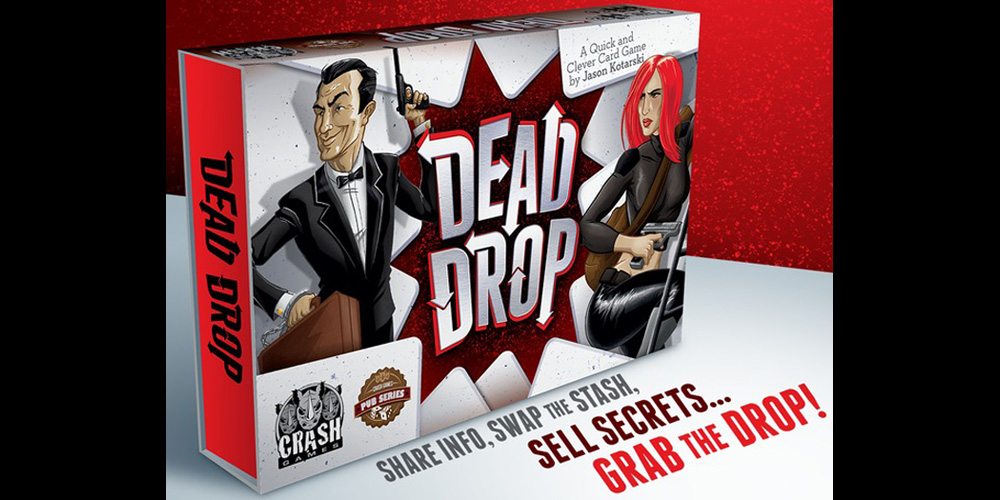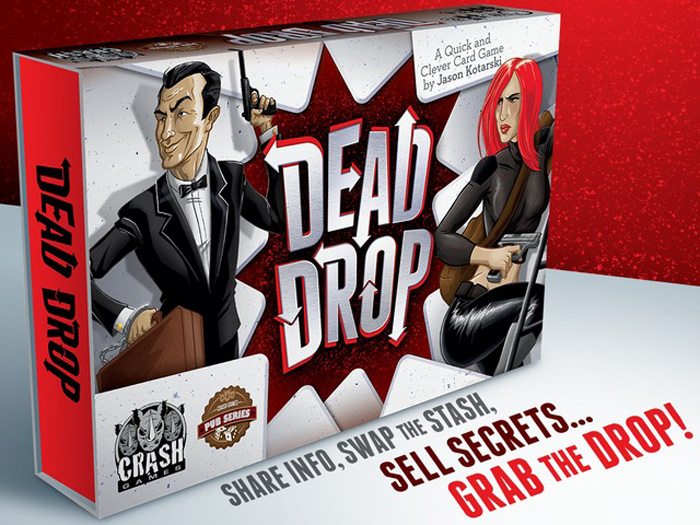There’s an important piece of information out there, and everyone’s after it. It could be the most valuable MacGuffin ever. Your goal is to figure out the secret before everyone else and get to the Dead Drop.
At a glance: Dead Drop is a deduction-based microgame for 2 to 4 players, ages 13 and up, and takes about 10 minutes to play. It’s currently on Kickstarter: $12 pledge for the base game, or $22 for the deluxe. Thematically I think there’s nothing terribly inappropriate for younger players (depending on your opinion of the character illustrations) but the deduction element could be challenging. Also, although the game says it’s for 2 to 4 players, I’d recommend having at least three.
New to Kickstarter? Read our crowdfunding primer.

Components:
The basic ($12) game includes:
- 13 Spy cards
- 4 reference cards
- 9 victory cubes
The deluxe ($22) version adds a cloth travel bag, replaces the cubes with little wooden envelope tokens, and also will include all stretch goals hit during the campaign. The stretch goals are basically entire new decks of 13 Spy cards with other themes, illustrated by other artists. You can mix and match or just use a different one. One bonus is that some of the other sets are more kid-friendly, if you decide you don’t want to use the default set.

How to play
The goal of the game is to win three rounds by grabbing the drop.
The cards are shuffled, and one is placed face-down as the drop. A few cards are turned face-up on the table as the cache, and the rest are dealt out to players. (The number of cards in the stash and players’ hands depends on the number of players.)

On your turn, you do one of the following:
- Share Info: trade a card from your hand with one other player.
- Hack the Cache: Trade a card from your hand with one from the cache.
- Sell Secrets: Show two cards from your hand to another player. If they have a card that equals the sum of your cards, they must give it to you, and you give them one of the two cards you revealed.
Finally, at the end of your turn, you may optionally Grab the Drop: reveal two cards from your hand to everyone. Peek at the drop to see if the card there is the sum of your two cards. If it is, you reveal it and win the round. If not, you put it back, reveal all your cards, and you’re out of the round.
First player to win three rounds wins the game.

The Verdict
Dead Drop is designed by Jason Kotarski, whose past games include Great Heartland Hauling Company and Fidelitas (which was successfully Kickstarted this summer). This one is the smallest of the bunch—at only 13 cards, I suppose it qualifies as a microgame.
Figuring out what’s in the drop requires a nice bit of deduction and guesswork. Each card has icons indicating how many of that number are in the entire deck. So if you see the #5 in the cache or in your hand, you know that there it’s not in the drop. Eliminating some of the other numbers may be trickier, though, particularly as cards get traded from player to player. Is that #0 the one that I traded away earlier, or is it a different one?
A key part of the game is the fact that in order to get information, you must give information, with costs relative to the value of what you’re getting. Trading with the cache gets you a known card, but lets everyone know what you had in your hand. Trading with a player only gives information to one other player, but you don’t get to choose what you’re getting in return. Selling secrets may give you a particular card from a player, but now that player knows two cards in your hand.

Even if you think you know what’s in the drop, grabbing it requires you to have two cards that add up to that number. In a 4-player game, you only have two cards in your hand total, so maneuvering your way to the goal can be tricky. This can feel like a feature or a bug, depending on how you look at it. You can prevent somebody from grabbing the drop if you can take cards away from them—of course, that can only happen if you figure out what they’re holding and how they can use them. On the other hand, it can be frustrating to know what’s in the drop, and be unable to get the cards required to claim it.
I did try playing Dead Drop with two players, and I think you can get a feel for the game, but ultimately there are some weird issues that can arise. For two players, the cache is only two cards, and you each have five in hand. Depending on what’s dealt to you, you may be able to eliminate several possibilities right from the start. In some cases it’s very easy to use the “Sell Secrets” action just to make sure your opponent doesn’t have the one card you’re not sure about—and if they don’t have it, then you can immediately use that same pair to Grab the Drop and win the round. We considered playing two players by dropping the “Sell Secrets” option but I’m not sure if that would solve the issue.

However, with more players, the game gets a lot more interesting because there’s a lot of information being shared among pairs of players, and usually there are people being left out of the exchange. To win, you need to be able to figure out how to use available evidence, how best to confirm or refute your guesses, and what info to share that will be least helpful to other players.
As it turns out, I’m not really great at Dead Drop. I have figured things out and won a round or two, but generally it seems like I’m a step behind most of the other players. That’s okay, though, because I still had a good time trying to puzzle things out.
Overall, Dead Drop is a great entry-level deduction game—by which I mean it’s easy to learn, not that it’s easy to win. It’s part of Crash Games’ “Pub Series,” which means that it’s a light enough game you can break it out and play it at a pub or a restaurant, and it’s also compact enough (and doesn’t take up a lot of table space) so you can play almost anywhere. At $12 for the basic game, it’s a great price; the $22 will become more valuable as additional decks are added, and that mostly depends on whether you like variant artwork.
For more about Dead Drop or to back the project, visit the Kickstarter page.
Disclosure: GeekDad received a demo prototype of this game.





